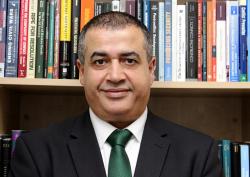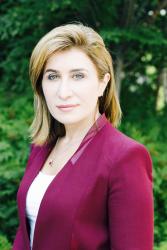

1:30 am +04 - 3:00 am +04
Past Event
1:30 am - 3:00 am +04
Intercontinental Doha, Al Isteqlal Road
Doha
Content from the Brookings Doha Center is now archived. In September 2021, after 14 years of impactful partnership, Brookings and the Brookings Doha Center announced that they were ending their affiliation. The Brookings Doha Center is now the Middle East Council on Global Affairs, a separate public policy institution based in Qatar.
The Brookings Doha Center (BDC) hosted an event on December 28, 2015 about Arab youth and how they are likely to influence their region in the aftermath of the Arab Spring. Bessma Momani, an associate professor in the Department of Political Science at the University of Waterloo and the Balsillie School of International Affairs and a senior fellow at the Centre for International Governance and Innovation, discussed her recent book, Arab Dawn: Arab Youth and the Demographic Dividend They Will Bring.
Momani began her presentation by saying that she wrote the book for the youth because in the West there is so much negativity about the Middle East, while her meetings with students from the region have given her hope. That hope stems from what she described as “a fundamental intergenerational change.” Summarizing the book’s argument, Momani said, “There is already a social and cultural revolution in the very thinking of the youth. There is fundamentally a change in values.” Expanding, she explained that Arab youth favor entrepreneurialism, political freedom, and cosmopolitanism.
Regarding entrepreneurship, Momani reported that it is growing faster and is viewed more favorably in the Arab world than in any other region. Momani argued that this reflected a change in thinking about the relationship, or social contract, between governments and people. Entrepreneurialism, she asserted, can challenge the patrimonial system of the government being responsible for providing services and the people being passive recipients. Momani found that Arab youth today feel that they do not need the state, and even want it out of their way. She added that women in particular are embracing entrepreneurship and noted the importance of cheap connectivity in facilitating its rise.
Momani also emphasized the region’s demographic advantages, as the median age in the Arab world is under 30 while it is over 40 in Japan, South Korea, and most of Western Europe. Because “great ideas come in your 30s, not your 70s,” she contended, investors know that innovation and growth is likely in the Arab world. Momani highlighted that the Arab region’s growing workforce is better educated than many realize, thanks to huge growth in higher education. Acknowledging that quality remains an issue, Momani emphasized the confidence that youth gain from their education. She cautioned that governments need to understand that when people ask for things, it is not necessarily a challenge to their power, but rather the behavior of an educated population. Overall, Momani argued that the region has a great opportunity to develop, but that it is incumbent upon the governments to capitalize.
When quizzed about the feasibility of Arab youth realizing their entrepreneurial potential in a region that is often unfriendly to do business in, Momani noted that China was opaque and difficult to business with 15-20 years ago, but now it is already saturated. She argued that Arab governments must start courting international investment, and that doing so will require increased transparency. Momani also stressed that the new entrepreneurs are not the crony capitalists, which means a clash is coming. Just like in many developed countries, she said, the entrepreneurs will eventually hit a glass ceiling and governments will have to decide whether to rely on the cronies, who are no longer able to do much, or to turn to new enterprises that are scaling up.
Addressing political freedom, Momani explained that the youth have ideas and no longer believe the state should be the master of all ideas. They think they should have the right to operate in political space, and do not view opposing the state as being disloyal. Momani suggested that observers are mistaken to keep looking for Western markers of political liberalization, like the formation of political parties. She noted that youth are indeed challenging governments and exchanging ideas, but they are doing it online rather than at town halls, making it necessary to “adjust our lens.” Momani agreed that the conflict in Syria has discouraged unrest, but held that in 15-20 years “the choice of the autocratic bargain will not hold.” Arab youth, she remarked, want meritocracy, and governments will either change or face additional revolutions in the future.
Providing more detail, Momani observed that the highest rates of YouTube uploads and tweets are in the Arab world, showing that Arab youth are not merely consuming content, but generating it and sharing their opinions. She added that women are writing 50 percent of blogs, many of which are very spiritual, but also revolutionary. Momani said that in conducting her research she constantly heard the idea of people deserving better. Citing polls, she reported that 92 percent of Arab youth want democracy—and that studies leave no doubt that they mean liberal democracy.
Momani also argued that Arab youth are now far more cosmopolitan than could have been imagined. They believe they can be both Eastern and Western, she explained, rather than having to choose between them as in prior generations. “The idea of a hybrid identity is something I saw held deeply,” she added, noting that youth are also adopting a hybrid of Western and Islamic identity, rejecting the past dichotomy of “secular” versus “Islamist.”
Saudi Arabia in particular is likely to see significant change, Momani reasoned. She shared that 64 percent of Saudi youth want to marry for love, a 10 percent increase from a decade ago that reflects “an Arab youth that’s more confident” and has more respect for themselves as individuals. Momani also pointed to the 160,000 Saudis that come home after graduating from Western universities every year, bringing with them Western ideas. “They are going to be more active citizens” that will not accept being told what to think and do by their governments, she argued.
In closing, Momani described her book as an exercise in thinking about the future and was adamant that “we have to stop thinking that the future will be worse than the present. I don’t believe it.” She recalled how in the late 1980s Latin America was the region plagued with wars, coups, and economic challenges, and reiterated that the onus is on Arab governments to recognize the youth as an asset, not a threat. Finally, Momani concluded that the Arab Spring was not the end of a short period of unrest but the beginning of a social and cultural revolution that will carry the region to a better place.



Noha Aboueldahab
August 23, 2021

August 23, 2021

Yasmina Abouzzohour
August 19, 2021